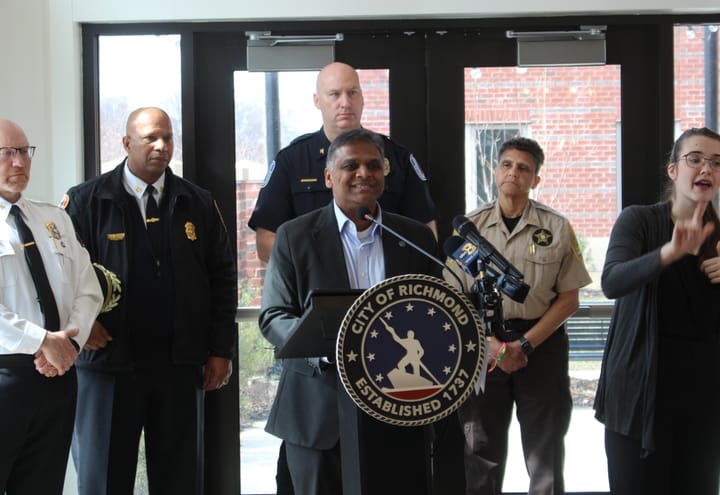
A lawyer for the city said he didn’t ask for the sealing of a court document. Emails tell a different story.
Last week, a private attorney representing the city government in a high-profile lawsuit told The Richmonder the city didn’t ask a judge to take “any action whatsoever” before the judge sealed a court document from public view.
However, newly surfaced emails show the attorney — Jimmy F. Robinson Jr. with Ogletree Deakins — did, in fact, request that the document be sealed.
Circuit Court Judge Claire G. Cardwell pressed Robinson on the discrepancy in a public court hearing Tuesday, saying she had sealed the document only because the city’s attorneys had urgently asked her to intervene and she wanted time to get a better grasp on the situation.
Cardwell unsealed the document Tuesday.
“I’m the one that sealed it based on emergency emails,” Cardwell said. “I’m going to undo it.”
Cardwell read out portions of the emails from Robinson about the sealing, indicating she found the statement by Robinson to The Richmonder contradictory to the emails Robinson had sent to her office.
The dispute was over a report detailing how the city has searched for electronic records in response to a lawsuit filed by former Richmond Freedom of Information Act officer Connie Clay.
Among other things, that report revealed that the city had no digital backup of a city-issued cell phone used by former communications director Petula Burks, who was Clay’s boss. Burks reportedly lost the phone in question in the summer of 2024, several months after she was named as a defendant in Clay’s lawsuit.
Clay sued the city last year, claiming she was wrongfully fired after speaking up against what she believed to be the city’s failure to follow Virginia’s transparency laws that require the city to release public records. The city’s lawyers say Clay was let go because she clashed with colleagues and wasn’t a good fit for the role.
Though the case is specifically about whether Virginia’s whistleblower protection law should or shouldn’t apply to Clay, the litigation has veered off course due to escalating hostilities between the city’s hired attorneys and the lawyers representing Clay.
The battle over the sealed document is the latest of many procedural disputes in the case. Under Virginia law, court proceedings and court filings are presumed to be open unless there’s a compelling reason to withhold particularly sensitive or private information.
Clay’s team filed a motion to unseal the document, arguing that in a case about government transparency the city’s representatives are now going to abnormal lengths to conceal documents related to the lawsuit itself.
Clay’s lawyers — Sarah Robb and Helen Hardiman — have been trying to compile evidence that could shed light on the reasons for Clay’s firing. They’ve complained for months the city has been stonewalling their efforts to gather that information, but the city’s lawyers have insisted they’re making good-faith efforts to find and turn over everything.
To help settle that dispute, the judge ordered the city’s attorneys to file the report explaining the search for evidence.
After Clay’s lawyers attached the report to a public court filing on Nov. 5, Robinson emailed a clerk for Cardwell on Nov. 6 to object, arguing the document was submitted for the judge’s private review and wasn’t supposed to be public. He then asked for the court to “immediately seal the filing” to “prevent further dissemination.”
A few days later, Robinson denied that the city had asked the judge to act.
“There was no dispute between the parties as to whether the filing should have been sealed,” Robinson said in a Nov. 11 email to The Richmonder. “Also, the ‘city’s legal team’ did not ask Judge Cardwell to seal the spoliation filing or any of its contents or to take any action whatsoever. She did that sua sponte (on her own).”
The emails show Robinson was concerned The Richmonder had a copy of the report with new details about the lost phone. He implied Clay’s team had improperly tipped off the media about the filing. Robinson also asked the court for an emergency conference call to “manage the media issue.”
“They already provided it to the press anyway,” Robinson said at Tuesday’s hearing.
Cardwell said the city had become “indignant” about an alleged breach of confidentiality when she never asked for the document to be filed confidentially. The city’s assumption the document was supposed to be private, Cardwell said, was “based on nothing.”
“If it’s filed, it’s public record,” the judge said.
Robb made the behind-the-scenes email correspondence public by attaching it to recent court filings.
Robinson rejected the notion there was anything untruthful or contradictory about his statement to The Richmonder.

The question The Richmonder sent to Robinson and other city officials read as follows: “Did the city's legal team ask the judge to seal the information filed in this motion? If so, why?”
Robinson argued Tuesday that the city had technically asked for the court clerk's office — not the judge herself — to do the sealing.
“The clerk has no authority to seal public records,” Cardwell replied.

Tuesday’s hearing did little to advance the substance of the case. Beyond the unsealing of the document, it was largely about scheduling future hearings and filing dates.
Clay’s team has a pending motion asking the judge to formally rule that the city has failed to preserve key evidence by completely losing the former city spokeswoman’s phone.
Cardwell didn’t rule on that motion Tuesday. But she said she has “great concern” about that detail coming out so late in the proceedings, only after she had reviewed what she thought to be the phone in question and found it mostly blank.
“The phone that I’d been given to review in camera was a replacement phone,” Cardwell said. “No one ever told me that.”
After asking for more time to question Burks under oath, Clay’s team abruptly called off that deposition, which was set to happen Monday.
Robinson voiced frustration about that development Tuesday, saying he had recently had a death in his family and took time away from that to prepare for a deposition Clay’s lawyers didn’t show up for.
Clay’s team had asked for the deposition to be postponed, saying the new revelations about the missing phone had upended their plans. In one recent filing, Robb said she might ask the judge to order a “forensic analysis” of several city cell phones to find out how they were handled.
Costs still unknown due to lack of invoices
It remains unclear how much the city is paying the outside law firm to handle the long-running case, which was filed in March of 2024 and is currently set for a jury trial in June of 2026.
In June, Robinson and Ogletree stopped submitting billing invoices to the city detailing how much time was being spent on the case and how much it would cost. Robinson objected to media coverage of those invoices and claimed it was improper for Clay’s team to be filing FOIA requests to potentially learn details about the city’s legal strategy.
The city has spent nearly $235,000 on the case already, but the true cost is likely much higher because of the time that’s elapsed with no invoices.
On Sept. 23, Robinson told The Richmonder the invoice stoppage was not a deliberate tactic to avoid disclosure of the invoices but was instead caused by an “internal administrative issue” in his office that was preventing bills from going out.
City officials seemed to go along with that explanation, saying in late September that they expected the invoices to resume soon.
Clay has said she doesn’t believe the explanation that an unfixable technical glitch is preventing the law firm from billing the city for such a long time.
Through a FOIA request, The Richmonder obtained an invoice Ogletree submitted to Virginia State University dated Aug. 4, which was during the period that the firm suggested it was unable to bill the city. The VSU bill covered work one of the lawyers working on the Richmond FOIA officer case had completed in January.
When asked for an explanation of how Ogletree was able to bill VSU but not the city, Robinson did not respond.
When city spokesperson Mira Signer was asked why the invoices are still not being filed, Signer indicated she could provide no new information. She referred The Richmonder back to the city’s response in September.
Contact Reporter Graham Moomaw at gmoomaw@richmonder.org






